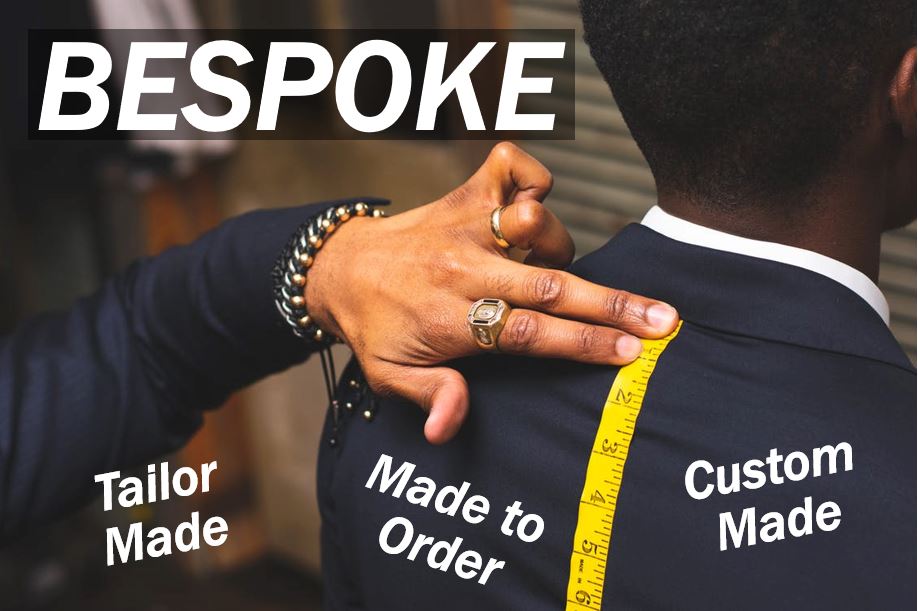What is bespoke? Definition and examples
If we tailor something or customize it according to the preferences or instructions of the customer, it is a bespoke item. We have made it specially for a particular individual, company, or organization. The term custom made has the same meaning. Bespoke is part of the umbrella term customization.
 Bespoke vs. off the rack
Bespoke vs. off the rack
A bespoke provider makes something from scratch according to the specifications and preferences of the customer. It is the opposite of off the rack or off the peg. A bespoke item of clothing, for example, is more expensive than something you see in a shop and buy, i.e., an item that is off the rack. In North America, the term ‘off the rack’ is more common, while Britons, Irish people, and Australians commonly use ‘off the peg.’
Most English-speaking countries also use the term ‘off the shelf.’
TechTarget says the following regarding the meaning and use of the term:
“Traditionally applied to custom-tailored clothing, the term has been extended to information technology, especially for software consulting services. Typically, software consulting companies offer packaged (already invented and generally applicable) software and bespoke software for client needs that can’t be satisfied by packaged software.”
Bespoke medicine
We also refer to this type of medicine as theranostics, precision medicine, P4, stratified medicine, or personalized medicine. In this medical model, healthcare professionals separate patients into specific groups.
Medical interventions, practices, and decision are tailored to each individual based on his or her risk of disease or the type of response we expect. We also use the term when talking about medical devices that we create for specific patients or patient groups.
Wikipedia makes the following comment about personalized medicine:
“the term has risen in usage in recent years given the growth of new diagnostic and informatics approaches that provide understanding of the molecular basis of disease, particularly genomics. This provides a clear evidence base on which to stratify (group) related patients.”
Bespoke portfolio
A person’s portfolio is their spread of investments. My portfolio may consist of 20% gold, 35% company shares, 35% bonds, and 10% cash.
When an account manager develops a spread of investments according to the needs and desires of a client, we call it a bespoke portfolio.
When you ask somebody or a firm to develop a portfolio for you, they will ask you several questions regarding your finances and whether you are risk averse or a risk neutral. If you are risk averse, it means that you prefer safe investments, i.e., you don’t like taking risks. Risk neutral investors, on the other hand, don’t mind some risk if there is a chance of a good return.
Pocket Sense says the following about portfolios tailored to customers’ needs:
“When developing a portfolio, you will be asked to answer a number of questions regarding your financial situation. Expect questions and a lot of paperwork when developing a bespoke financial plan.”
Bespoke software
When a company develops software specifically for a company or organization, we call it bespoke, tailor made, or custom software. It contrasts with COTS (commercial off-the-shelf) programs.
If you want a software house to develop a program specifically for the needs of your company, you must be willing to pay significantly more than you would for a COTS option.
 According to IBM, an American multinational technology company:
According to IBM, an American multinational technology company:
“Efforts associated with custom software development include application customization, application modernization and application management.”
Three types of application:
- Customization means altering COTS applications.
- Modernization is all about updating and maintaining programs.
- Management may include installation, carrying out updates and optimizations, general maintenance, and customer service.
Etymology of bespoke
We refer to the origin of a word or phrase as its etymology. Etymology also includes finding out how a word’s meaning has evolved over time.
According to the Online Etymology Dictionary, the adjective Bespoke with the meaning “made to order” or “custom made” emerged in the English language in 1755.
Records also exist of the past-participle adjective from Bespeak circa 1600. At the time, it meant “arrange beforehand” or “speak for.” The word Bespeak appeared in the 1580s.
Video – What is Customization?
Interesting related article: “What is Software?“

